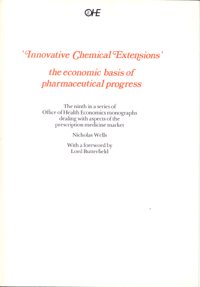Sign up to our newsletter Subscribe
Altering the Trajectory of HIV in Europe

This is an important paper based on original economic analyses of the new entrants to various pharmaceutical sub-markets. To use a sporting analogy, it indicates that the first one away from the starting line, or even the leader after the first lap, will…
This is an important paper based on original economic analyses of the new entrants to various pharmaceutical sub-markets. To use a sporting analogy, it indicates that the first one away from the starting line, or even the leader after the first lap, will not necessarily be the eventual winner of the race. Quite late entries in particular pharmacological sub-groups may turn out to be the most valuable and the most widely prescribed of all the alternatives eventually available. These findings are strong arguments against the introduction of so-called ‘need clauses’ in decisions to licence or reimburse a new medicine. And the true value of what are often disparingly described as ‘me too’ medicines may not be established until several years after they have been available for prescription. It is simply not possible to predict how necessary a medicine will prove to be before it has been marketed.
For this reason, Nicholas Wells’ other main contribution in this paper has been to coin a new phrase — ‘innovative chemical extensions’, or ‘ICEs’ — for the chemical variants which are developed after a major novel innovation. It is a usefully descriptive phrase indicating the idea of an innovative advance building upon established therapies whilst avoiding altogether the inaccurate notion of direct duplication implied by the term ‘me-too’. Apart from their own therapeutic importance, Wells’ paper demonstrates that ‘ICE’s are essential for the economic support of pharmaceutical innovation as a whole. They make important contributions to the welfare of patients, not only through their own direct role in therapy but also through their contribution to the forward progress of medicine as a whole. I believe the process of pharmaceutical innovation would be very seriously hindered by any attempt to limit it to major ‘breakthrough’ innovations alone. That would seriously restrict the future benefits for patients, which, after all, is what pharmaceutical innovation must always have as its main objective. I hope this paper helps readers to understand the role of ‘ICEs’ in this connection: we all owe Nicholas Wells our gratitude for his analyses and what they have demonstrated.
So I am very pleased to commend this latest OHE publication to you. It traces the author’s analytical thought about the process of successful developments of improved new medicines. It shows that, from the innovative new chemical entities created by the pharmaceutical industry there emerge not just the ill-fated compounds, the so called ‘me-too’s’, but much more significantly, the ‘winners’ —anyway until they too are overtaken in their post marketing phase by even better compounds. This is the evolutionary aspect of the pharmaceutical revolution. I say pharmaceutical not simply pharmacological because this word embraces the whole outcome of all the complexities of treating the public for disease, world wide
Innovative Chemical Extensions: The Economic Basis of Pharmaceutical Progress
Wells, N.
(1988) Innovative Chemical Extensions: The Economic Basis of Pharmaceutical Progress. OHE Monograph. Available from https://www.ohe.org/publications/innovative-chemical-extensions-economic-basis-pharmaceutical-progress/

